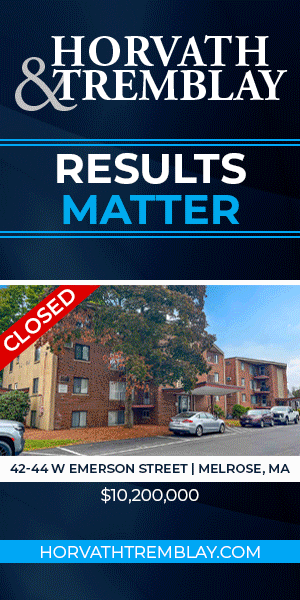Boston PropTech Startups Aim to Boost Owners & Managers Bottom Lines
May 22, 2019 - By Jim Morrison
BOSTON-The Proptech wave is washing over Greater Boston. As the hub has quickly become one of the foremost bio, medical and industrial technology cities in the world, property technology is starting to make a name for itself as well - and local innovators are contributing to its rise. Homegrown CRE tech trailblazers are using automation to collect data which helps building owners lower operating costs, improve performance, and retain tenants by discovering what tenants like and then pairing them with more of their lifestyle amenities.
Chase Garabino, the co-founder of HqO, a tenant experience (Tex) platform company said his software provides perks to tenants while giving landlords the opportunity to “own their relationship” with the people who use their building every day. “It’s fascinating to me that people will buy a commercial building for hundreds of millions of dollars without knowing more about how people use that product,” Garabino said.
HqO partners with amenity providers within proximity to commercial buildings that they work with and coordinates product events, demonstrations, and deals for people who work in those (partner) buildings. It has been free waffles, discounted meal delivery, chair massages, and office products; all with the intention of improving communications, and building better relationships between tenants and building management - but only available to office workers who’ve downloaded the company’s app.
HqO then anonymizes and aggregates the data and shares it with the building owner, giving the owner real data on what amenities tenants value. In turn, tenants get deals on the things they want, which should add to them liking their workplace more. The company works with area vendors to tailor the mix of deals to what tenants respond to. Garabino said that can vary widely from urban to suburban settings. Their software is currently active in buildings in Boston, NYC, Washington DC, Atlanta, Chicago, Seattle, San Francisco and Houston.
In addition to keeping tenants happy, the app can help with leasing, and inform asset strategy decisions, like whether or not to put a restaurant in a building. It can also be a means of increasing revenue from the building. “There are so many dollars spent on services in a building, it’s like its own small economy,” he said. “If you can facilitate that and capture it through software, you can increase rent or potentially make money per transaction.”
On average, Garabino said about 70 percent of tenants download the app in buildings that use the platform. With the growing trend of mixed-use developments, Garabino’s team is evaluating a residential model as well.
Turning Apartment Buildings Into Communities
Ben Pleat, Co-founder of Boston-based Cobu, said his mission is to create genuine communities within apartment buildings. The application doesn’t get involved in building services, paying rent, or managing assets. Cobu’s platform is designed to foster and grow a sense of community among the residents in apartment buildings. Residents engage with events and get discounts from local businesses. Data is anonymized, analyzed and shared with the building management team.
“Surveys indicate roughly 54% of people say they’re chronically lonely,” Pleat said. “We want them to feel like they’re at home.” Pleat said residents who feel happy, at home and connected to their neighbors are less likely to move. Certain buildings with the right sense of community could even command higher rents.
Residents can use the app to organize activities like board games or movies in a building’s community room, start a 6 am running club, or start a baking club. It’s currently in just under 3000 apartments in Greater Boston and 25%-65% of tenants in those units use it, though Pleat stresses that all building residents are welcome to all events whether they download the app or not. “Building community is not easy,” Pleat said. “It can be created and improved, but it can never be perfect.”
“We employ surveys derived from the Sense of Community Index,” he said. “We measure them through our app and a survey we send residents. It allows us to see how a community is performing and how we can use that data to make it work better.”
Pleat said his platform has been in one building for two years now and they are already measuring an improved sense of community from residents. He’s currently looking to expand into the Washington DC market.
“There’s a lot of excitement about how technology is going to augment the business,” he said. “There’s a lot of talk about home automation and smart apartments in CRE. It’s starting to be embraced at a portfolio level - It’s really starting to blossom. People want to be making data-driven decisions, concludes Pleat.”
Saving Energy, Improving Comfort in Multifamily Dwellings
“We’re about tackling the top 3-4 pain points for owners of multi-unit residential properties,” said embue CEO, Robert Cooper. “You learn quickly that multifamily owners are incredibly financially aware. That means they primarily care if your product will make them money or save money. Particularly in multi-residential, because there’s less income to spend per-square-foot than in commercial buildings.”
The company’s platform monitors the use and performance of HVAC equipment, lighting & other utilities, and collects data for the owners and operators. It can also allow owners and managers to control the devices remotely from their smartphones.
“I can personally confirm that [remote] function works,” Cooper said. “On a recent visit to the Guinness Brewery in Dublin, I received an alert about the heat in my house and was able to resolve it while sipping my pint.”
Cooper said embue is in 1,100 apartments with more than 1,400 sensors and devices spread over five or six buildings in Massachusetts. The dashboard the sensors are connected to can also predict maintenance issues and diagnose HVAC problems - remotely saving time and money for owners and managers and improving residents’ comfort.
“You can’t save energy by just working on the system in the basement,” Cooper said. “You have to know how much energy the building needs, you have to know which apartment is the hottest and which is coolest. We give owners and managers continuous data in real time and we can ensure what we do is still working. That benefits both the owner and the resident.” He said it depends on a lot of variables, but most owners recoup the investment in two years of energy savings. And since so many of Boston’s commercial building stock is old, it’s an ideal market for him to launch in.
“We actually like the energy hog buildings,” he said. “There are huge energy savings to be had in those buildings, but the opportunity is in smart controls. We can smooth out their energy demand. That’s going to be more important as more renewable get into it ... owners, residents can get paid for reducing peak demand,” Cooper assured.
It is a relatively new and slow to adopt technology, yet Billions of dollars have been poured into PropTech funding over the past few years, and the Boston market continues to be an incubation for new platforms - with startups hatching every few months. As transparency in the CRE industry evolves, we should expect to see the growth and diversity of tools available. One industry Investor commented after recently evaluating CRETech software, “not one tech fits all buildings and owners, yet we will continue to adapt, experiment and adjust to see what can help with our bottom line.”

 Chase Garabino
Chase Garabino
 Robert Cooper
Robert Cooper
 Ben Pleat
Ben Pleat
 Cobu Event at Inkblock Boston
Cobu Event at Inkblock Boston

.gif?mtime=1757534141)



